大学_文化-The Generation Gap_371463_11771486
大学文化与精神
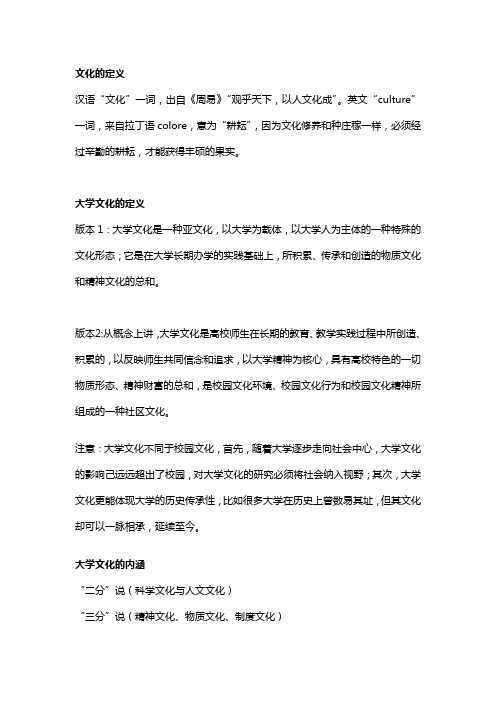
文化的定义汉语“文化”一词,出自《周易》“观乎天下,以人文化成”。
英文“culture”一词,来自拉丁语colore,意为“耕耘”,因为文化修养和种庄稼一样,必须经过辛勤的耕耘,才能获得丰硕的果实。
大学文化的定义版本1:大学文化是一种亚文化,以大学为载体,以大学人为主体的一种特殊的文化形态;它是在大学长期办学的实践基础上,所积累、传承和创造的物质文化和精神文化的总和。
版本2:从概念上讲,大学文化是高校师生在长期的教育、教学实践过程中所创造、积累的,以反映师生共同信念和追求,以大学精神为核心,具有高校特色的一切物质形态、精神财富的总和,是校园文化环境、校园文化行为和校园文化精神所组成的一种社区文化。
注意:大学文化不同于校园文化,首先,随着大学逐步走向社会中心,大学文化的影响己远远超出了校园,对大学文化的研究必须将社会纳入视野;其次,大学文化更能体现大学的历史传承性,比如很多大学在历史上曾数易其址,但其文化却可以一脉相承,延续至今。
大学文化的内涵“二分”说(科学文化与人文文化)“三分”说(精神文化、物质文化、制度文化)“四分”说(精神文化、制度文化、行为文化、物质文化)注意:以下整理采取此种分类“六因素”说。
即大学文化包括环境文化、学术文化、科技文化、艺术文化、阵地文化、网络文化等六个因素。
大学精神(精神文化)大学精神是大学文化的核心与灵魂,对大学文化的其它层次起着统领和引导作用。
所谓大学精神文化,是指大学基于时代要求、历史传统和大学使命,所体现出来的精神、理念与价值追求等。
一般而言,大学精神应当包括办学理念、目标定位、学风、校风建设、师生群体意识、大学精神符号(校训、校服、校徽、校旗、校歌)等。
1. 校风、教风、学风等均围绕自身大学精神为指南针,务求把学校的精神文化内化成每位师生员工的行为准则,打造独具本校魅力的精神文化。
2. 校训、校歌和校史是培育大学精神的重要抓手,是高校统一思想、凝聚力量的重要载体。
中国传统文化在大学教育中的现状英语作文
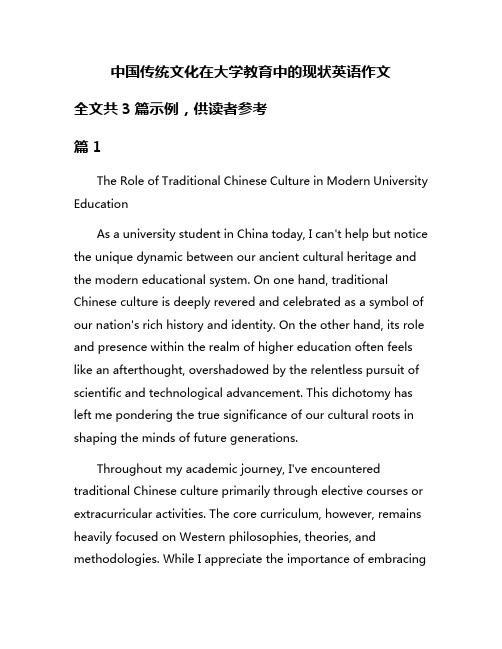
中国传统文化在大学教育中的现状英语作文全文共3篇示例,供读者参考篇1The Role of Traditional Chinese Culture in Modern University EducationAs a university student in China today, I can't help but notice the unique dynamic between our ancient cultural heritage and the modern educational system. On one hand, traditional Chinese culture is deeply revered and celebrated as a symbol of our nation's rich history and identity. On the other hand, its role and presence within the realm of higher education often feels like an afterthought, overshadowed by the relentless pursuit of scientific and technological advancement. This dichotomy has left me pondering the true significance of our cultural roots in shaping the minds of future generations.Throughout my academic journey, I've encountered traditional Chinese culture primarily through elective courses or extracurricular activities. The core curriculum, however, remains heavily focused on Western philosophies, theories, and methodologies. While I appreciate the importance of embracingdiverse perspectives, I can't shake the feeling that we're gradually becoming disconnected from the very essence of what makes us distinctly Chinese.Take, for instance, the study of classical Chinese literature. Masterpieces like the "Analects of Confucius" and the "Tao Te Ching" are often reduced to mere footnotes in our modern literature classes. We skim through their profound wisdom and ethical teachings, failing to truly grasp the depth of their influence on our societal values and cultural identity. Similarly, the rich tapestry of Chinese art, music, and calligraphy frequently takes a backseat to their Western counterparts, treated as niche interests rather than integral components of a well-rounded education.This marginalization of traditional Chinese culture extends beyond the humanities and into the realms of science and technology as well. While we excel in cutting-edge research and innovation, there seems to be a disconnect from the philosophical underpinnings that once guided our ancestors' pursuit of knowledge. The holistic and harmonious worldview that permeated ancient Chinese science and medicine is often overlooked in favor of more reductionist and compartmentalized approaches.Admittedly, the integration of traditional Chinese culture into modern university curricula is no easy feat. We live in an era of globalization, where the exchange of ideas and the pursuit of universal knowledge transcend borders. However, I can't help but wonder if we've sacrificed too much of our cultural identity in the process. By neglecting our roots, are we depriving ourselves of the rich wisdom and unique perspectives that could potentially enrich our understanding of the world around us?It's not uncommon for students like myself to feel a sense of cultural dissonance, caught between the allure of modernity and the pull of tradition. We find ourselves grappling with questions of identity, struggling to reconcile our ancestry with the demands of the contemporary world. This internal conflict is further exacerbated by the lack of meaningful dialogue and exploration of traditional Chinese culture within the confines of our educational institutions.Perhaps it's time for a shift in perspective, a recognition that true progress and enlightenment can only be achieved by embracing the best of both worlds. We must strive to strike a balance, where the timeless wisdom of our ancestors seamlessly intertwines with the cutting-edge advancements of modern academia.Imagine a curriculum that not only introduces students to the philosophical and ethical teachings of Confucianism, Taoism, and Buddhism but also encourages critical analysis and application of these principles in our modern context. Envision courses that delve into the intricacies of traditional Chinese medicine, exploring its holistic approach to health andwell-being alongside modern medical practices. Picture classrooms where the study of Chinese art and literature is given equal weight as their Western counterparts, fostering a deeper understanding of the human condition through diverse cultural lenses.By integrating traditional Chinese culture into our educational frameworks, we wouldn't merely be paying lip service to our heritage; we would be empowering ourselves with a rich tapestry of knowledge and perspectives that could profoundly shape our worldviews and problem-solving abilities.Moreover, a renewed emphasis on our cultural roots could potentially reignite a sense of pride and identity among Chinese youth. Too often, we find ourselves torn between the allure of Western ideals and the pressure to conform to societal expectations. By reconnecting with the wisdom of our ancestors, we may rediscover the confidence to forge our own paths,guided by the time-honored values that have sustained our civilization for millennia.Of course, the successful integration of traditional Chinese culture into modern university education requires a concerted effort from all stakeholders – policymakers, educators, and students alike. It demands a willingness to challenge long-held assumptions, to break free from rigid curricular structures, and to embrace interdisciplinary approaches that celebrate the richness of our cultural tapestry.As students, we must be the driving force behind this change. We must actively seek out opportunities to explore and engage with our cultural heritage, whether through independent research, cultural immersion programs, or the formation of student-led initiatives. By advocating for a more inclusive and culturally responsive education, we can shape the future of our academic institutions and ensure that the voices of our ancestors continue to resonate in the halls of learning.Ultimately, the role of traditional Chinese culture in modern university education is not merely a matter of preserving our past; it's about cultivating a deeper understanding of ourselves and our place in the world. By embracing the wisdom of our ancestors while simultaneously pushing the boundaries ofmodern knowledge, we can forge a path that honors our heritage while propelling us towards a future of innovation, enlightenment, and cultural renaissance.篇2The Fading Light of Tradition: Traditional Chinese Culture in Modern University CurriculaAs a university student in China today, I can't help but feel a sense of loss and disconnection from the rich cultural heritage that has shaped our nation for millennia. In the relentless pursuit of modernity and globalization, it seems that traditional Chinese culture has taken a backseat in our educational institutions, overshadowed by the allure of Western ideologies and technological advancements.Walking through the corridors of my university, I'm bombarded with posters and advertisements promoting the latest technological innovations, international exchange programs, and cutting-edge research initiatives. While these endeavors are undoubtedly valuable in their own right, I can't shake the feeling that something essential is missing – a connection to our roots, to the wisdom and traditions that have sustained our civilization for generations.In my conversations with fellow students, it becomes increasingly evident that many of us lack a deep understanding of our cultural heritage. We may be able to recite a few lines from classical poetry or recognize the significance of the Qingming Festival, but our knowledge often feels superficial, a mere scratching of the surface. The rich tapestry of Chinese philosophy, literature, art, and history seems to be fading from our collective consciousness, replaced by a relentless focus on the pursuit of material success and global competitiveness.It's not uncommon to hear students express a sense of detachment from their cultural identity, struggling to find relevance in the ancient teachings and traditions that once guided our ancestors. The allure of Western pop culture and its pervasive influence have left many of us questioning the value of our own heritage, perceiving it as outdated or irrelevant in the modern world.Compounding this issue is the lack of comprehensive and engaging curricula that truly emphasize the study and appreciation of traditional Chinese culture within our universities. While we may have elective courses or seminars that touch upon these topics, they often feel like mere afterthoughts,overshadowed by the overwhelming emphasis on STEM fields, business studies, and practical vocational training.As a student passionate about preserving our cultural legacy, I can't help but feel a sense of urgency to address this growing disconnect. We cannot afford to let the wisdom and beauty of our traditions slip through our fingers, replaced by a myopic pursuit of material progress and global competitiveness.It is imperative that our universities take a proactive stance in integrating traditional Chinese culture into their core curricula, not as mere electives or supplementary courses, but as foundational pillars of a well-rounded education. By doing so, we can instill in our students a deep appreciation for the richness of our heritage, fostering a sense of pride and connection to our roots.Imagine attending lectures that delve into the profound teachings of Confucius, Lao Tzu, and the great philosophers of ancient China, exploring the timeless wisdom that has shaped our societal values and ethical frameworks. Envision seminars that dissect the literary masterpieces of our classical poets and writers, unveiling the layers of symbolism and cultural significance woven into their works.Picture courses that immerse students in the study of traditional Chinese arts, from calligraphy and painting to music and dance, cultivating an understanding of the intricate techniques and profound symbolism that have been passed down through generations. Imagine field trips to ancient sites and museums, allowing us to physically connect with the tangible remnants of our glorious past, fostering a deeper sense of reverence and appreciation.By integrating these elements into our educational experiences, we can create a generation of students who are not only well-versed in the latest technological advancements and global trends but also deeply rooted in their cultural identity. We can nurture a generation that understands the importance of preserving and carrying forward our rich heritage, while simultaneously embracing the opportunities and challenges of the modern world.Moreover, the study of traditional Chinese culture can offer invaluable insights and perspectives that are often overlooked in our pursuit of modernity. The philosophies and teachings of our ancestors can provide guidance on navigating the complexities of the human experience, offering wisdom on topics rangingfrom interpersonal relationships and societal harmony to environmental stewardship and ethical decision-making.By engaging with these time-honored teachings, we can broaden our intellectual horizons, cultivate critical thinking skills, and develop a more holistic understanding of the world around us. We can learn to appreciate the interconnectedness of all things, the delicate balance between tradition and innovation, and the importance of maintaining a harmonious relationship with our natural environment.Ultimately, the preservation and promotion of traditional Chinese culture within our universities is not merely a nostalgic endeavor; it is a vital investment in our collective future. By reconnecting with our roots and embracing the wisdom of our ancestors, we can forge a path that harmonizes the best of our heritage with the opportunities and challenges of the modern world.As students, it is our responsibility to advocate for the integration of traditional Chinese culture into our educational experiences. We must raise our voices and demand that our universities prioritize the study and appreciation of our rich cultural legacy, ensuring that it remains a vibrant and integral part of our educational journey.Only by doing so can we truly call ourselves the inheritors and custodians of a civilization that has endured for thousands of years, a civilization that has weathered countless storms and emerged triumphant time and time again. It is our sacred duty to carry this torch of tradition forward, illuminating the path for future generations and ensuring that the light of our cultural heritage never fades, but burns brighter than ever before.篇3The Fading Presence of Traditional Chinese Culture in University EducationAs a student in China, I have witnessed the gradual decline of traditional Chinese cultural education within the university system. While our rich heritage was once a cornerstone of academic curricula, its prominence has dwindled, overshadowed by the pursuit of Western-centric knowledge and skills deemed more relevant to the modern world. This erosion of our cultural roots is a concerning trend that warrants critical examination and redress.Throughout my academic journey, exposure to traditional Chinese culture has been limited and fragmented. Apart from a handful of elective courses that delve into classical literature,philosophy, or arts, the core curriculum offers little immersion in the vast expanse of our nation's cultural tapestry. The emphasis remains firmly rooted in the acquisition of technical and scientific knowledge, with scant regard for the invaluable wisdom and insights that have shaped our civilization for millennia.This neglect of our cultural heritage is particularly jarring in an era where globalization has amplified the need forcross-cultural understanding and appreciation. As we strive to assert our place on the world stage, it seems paradoxical that we are increasingly disconnected from the very essence of our identity – the rich traditions that have defined our collective consciousness for generations.The consequences of this cultural erosion are far-reaching and multifaceted. On a personal level, it deprives us of a profound connection to our roots, leaving us adrift in a sea of modernity, bereft of the anchors that could ground us in our shared history and values. We risk becoming a generation of cultural nomads, unmoored from the wisdom and lessons that have guided our ancestors through times of adversity and triumph.Moreover, the marginalization of traditional Chinese culture within academia threatens to stunt our ability to engage withand understand the world around us. As globalization brings diverse cultures into increasingly closer contact, a deep comprehension of our own heritage becomes invaluable in navigating these intercultural exchanges. Without a firm grasp of our cultural foundations, we risk misunderstanding and misrepresentation, unable to articulate the nuances and complexities that have shaped our societal norms and values.Beyond the personal and global implications, the neglect of traditional Chinese culture in universities also poses a risk to the preservation and transmission of our nation's rich legacy. If our institutions of higher learning fail to prioritize and cultivate an appreciation for our heritage, we risk losing invaluable knowledge and practices that have been carefully curated and passed down through generations. Traditions that have withstood the test of time could fade into obscurity, severing our connection to the wisdom of our forebears.It is incumbent upon us, as students and future leaders, to recognize the gravity of this issue and advocate for a more balanced and inclusive approach to education. We must not allow the pursuit of modernity to come at the expense of our cultural identity. Instead, we should strive to strike a harmonious equilibrium, where the acquisition of contemporary knowledge iscomplemented and enriched by a deep understanding of our traditional roots.Universities must take a proactive role in this endeavor, integrating traditional Chinese cultural education into their core curricula. This could manifest in various forms, from dedicated courses exploring our philosophical, literary, and artistic legacies, to interdisciplinary programs that examine the intersection of traditional wisdom and modern challenges. By fostering a holistic educational experience that celebrates our heritage while equipping us with the skills to navigate the contemporary world, we can nurture a generation of well-rounded individuals, deeply rooted in their cultural identity yet poised to thrive in a global context.Furthermore, universities should actively promote cultural exchange and dialogue, creating platforms for students to engage with and learn from traditional masters, artisans, and scholars. Through immersive experiences, such as workshops, performances, and dialogues, we can forge a deeper connection to our cultural heritage, cultivating a reverence and appreciation for the richness of our traditions.Ultimately, the preservation and promotion of traditional Chinese culture within university education are not merenostalgic endeavors; they are vital investments in our collective future. By embracing our cultural roots, we gain a profound understanding of our past, a grounding in our present, and a compass to navigate the challenges that lie ahead. It is only through this holistic approach to education that we can truly embody the essence of our civilization, honoring the wisdom of our ancestors while forging a path towards a future that harmonizes tradition with modernity.As students, we must raise our voices and advocate for change, demanding that our institutions of higher learning recognize the importance of traditional Chinese cultural education. We must be unwavering in our commitment to preserving and celebrating our heritage, for it is through this endeavor that we can truly unlock our full potential as individuals and as a nation. By reclaiming our cultural identity and integrating it into the fabric of our education, we can emerge as a generation of global citizens, deeply rooted in our traditions yet equipped to navigate the complexities of the modern world with wisdom, grace, and resilience.。
中国传统文化在大学教育中的现状英语作文
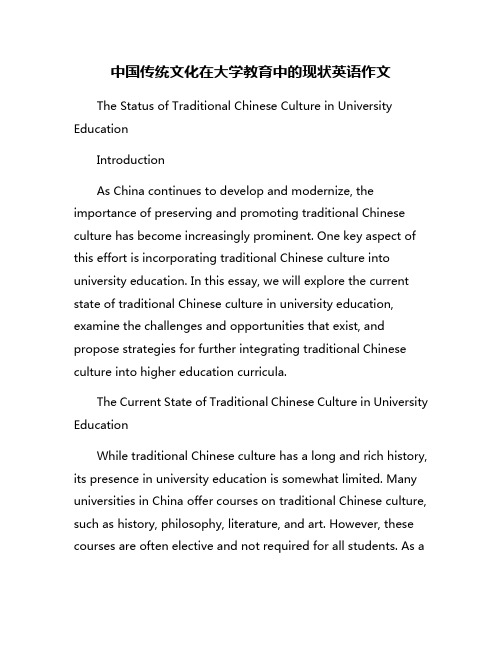
中国传统文化在大学教育中的现状英语作文The Status of Traditional Chinese Culture in University EducationIntroductionAs China continues to develop and modernize, the importance of preserving and promoting traditional Chinese culture has become increasingly prominent. One key aspect of this effort is incorporating traditional Chinese culture into university education. In this essay, we will explore the current state of traditional Chinese culture in university education, examine the challenges and opportunities that exist, and propose strategies for further integrating traditional Chinese culture into higher education curricula.The Current State of Traditional Chinese Culture in University EducationWhile traditional Chinese culture has a long and rich history, its presence in university education is somewhat limited. Many universities in China offer courses on traditional Chinese culture, such as history, philosophy, literature, and art. However, these courses are often elective and not required for all students. As aresult, many students graduate from university with a limited understanding of traditional Chinese culture.Furthermore, the emphasis in higher education in China has traditionally been on technical and scientific subjects, rather than on the humanities and liberal arts. This has led to a lack of focus on traditional Chinese culture in university curricula. As a result, many young people in China are more familiar with Western culture than with their own cultural heritage.Challenges and OpportunitiesThere are several challenges to incorporating traditional Chinese culture into university education. One major challenge is the perception that traditional culture is outdated and irrelevant in today's fast-paced, globalized world. Many students and educators believe that focusing on traditional Chinese culture will not prepare students for the demands of the modern workforce.Another challenge is the lack of qualified instructors who are able to teach traditional Chinese culture effectively. Many universities in China struggle to find instructors who are knowledgeable about traditional culture and able to engage students in meaningful ways.Despite these challenges, there are also opportunities to integrate traditional Chinese culture into university education. With the rise of cultural tourism and the increasing interest in Chinese history and heritage, there is a growing demand for courses on traditional Chinese culture. Universities can capitalize on this interest by expanding their offerings in this area and making traditional culture a core part of their curricula.Strategies for Integrating Traditional Chinese Culture into University EducationTo enhance the presence of traditional Chinese culture in university education, several strategies can be employed. One strategy is to make courses on traditional Chinese culture mandatory for all students, regardless of their major. By requiring all students to study traditional culture, universities can ensure that all graduates have a basic understanding of their cultural heritage.Another strategy is to incorporate traditional Chinese culture into other subject areas, such as science and technology. For example, courses on traditional Chinese medicine or traditional Chinese architecture could be offered as electives for students majoring in related fields. This would allow students to see theconnections between traditional culture and their own areas of study.Universities can also collaborate with cultural institutions and organizations to bring traditional Chinese culture to life for students. Field trips to historical sites, workshops with traditional artisans, and performances of traditional music and dance can all help students to experience traditional culture in a hands-on way.ConclusionIn conclusion, the status of traditional Chinese culture in university education is somewhat limited, but there are opportunities to expand its presence in higher education. By making courses on traditional Chinese culture mandatory, incorporating traditional culture into other subject areas, and collaborating with cultural institutions, universities can ensure that all students graduate with a strong foundation in their cultural heritage. By doing so, they can help to preserve and promote traditional Chinese culture for future generations.。
大学文化英文作文
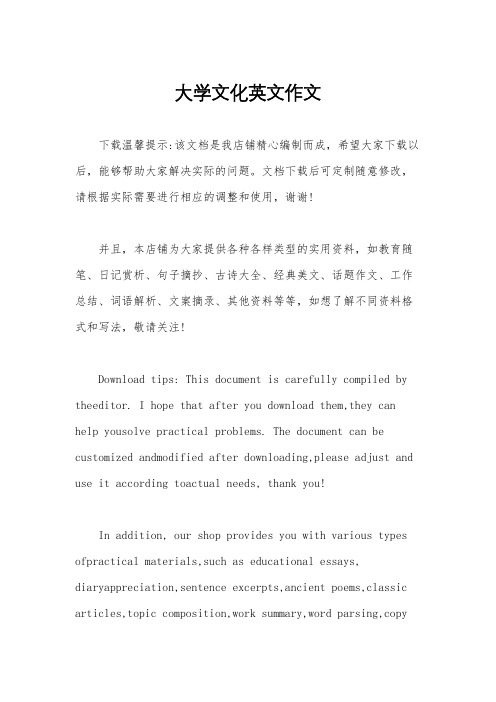
大学文化英文作文下载温馨提示:该文档是我店铺精心编制而成,希望大家下载以后,能够帮助大家解决实际的问题。
文档下载后可定制随意修改,请根据实际需要进行相应的调整和使用,谢谢!并且,本店铺为大家提供各种各样类型的实用资料,如教育随笔、日记赏析、句子摘抄、古诗大全、经典美文、话题作文、工作总结、词语解析、文案摘录、其他资料等等,如想了解不同资料格式和写法,敬请关注!Download tips: This document is carefully compiled by theeditor. I hope that after you download them,they can help yousolve practical problems. The document can be customized andmodified after downloading,please adjust and use it according toactual needs, thank you!In addition, our shop provides you with various types ofpractical materials,such as educational essays, diaryappreciation,sentence excerpts,ancient poems,classic articles,topic composition,work summary,word parsing,copyexcerpts,other materials and so on,want to know different data formats andwriting methods,please pay attention!College life is really interesting. There are so many things to do and explore. You can meet all kinds of people and make friends from different backgrounds.The classes in college are very different from high school. You have more freedom to choose what you want to learn and how you want to learn it.There are also a lot of clubs and activities on campus. You can join the ones that interest you and have a great time.And living in the dorm is a whole new experience. You learn to get along with your roommates and deal with different situations.。
大学英语-Unit-3-The-Generation-Gap

Scene 3. Father embarrassed Heidi by boasting to her new school official about how bright she was.
2. Sum up the main conflict in each part:
3. Analyze the characteristics of Father, Mother, and the children.
Audience
Conflicts: as the essence of a play, is a clash of actions, desires, ideas,or wills. It may happen in three forms:
man against man, man against environment, man against himself.
16.welfare
Parents are responsible for the ~ of their children.
4. The theme of the play:
Father interfered in children`s affairs with good intentions, but only to find his efforts unwelcome.
Listen and practice
Language study
批注本地保存成功开通会员云端永久保存去开通
College English
Integrated Course Book 2
Unit 3 The Generation Gap
Father Knows Better
大学文化

在对“文化”理解百花齐放的情况下,部分美国专家学者摆脱了“文化”多样性概念的困扰,而从实用性的角度考虑,对“校园文化”下了一个规范性的定义,以此统一人们对于校园文化的理解。
他们认为,校园文化是“学校的历史、使命、物质环境、标准、传统、价值观、办学实践、信仰、假说等诸多因素综合起来的且相互影响而形成的指导高校学生个体或团体行为以及认识理解校园内外一些事件、行为提供参考框架的一种模式。
我们认为, 大学文化是以大学为载体, 通过历届师生的传承和创造, 为大学所积累的物质成果和精神成果的总和, 主要包括精神文化、制度文化和物质文化三个方面。
精神文化是大学文化的灵魂和大学赖以生存、发展的精神支柱, 是学校的办学理念、价值取向、理想追求、道德情感等的哲学抽象, 它主导着制度文化和物质文化的发展方向; 制度文化是大学文化的核心内容, 主要表现为规章制度、组织架构及其运行规则等方面; 物质文化是大学文化的实体存在和外在表征, 主要由大学的物理空间设施以及学科、专业、课程、教学科研与生活环境等构成。
三个方面相互依赖、相互补充、相互促进, 共同构成一所大学特有的文化现象。
与其他社会文化相比, 大学文化具有非常鲜明的时代特质。
和谐大学文化建设的使命。
和谐大学文化是大学的软实力, 也是大学的核心竞争力。
在构建社会主义和谐社会中, 大学文化肩负着重要的使命和功能, 主要表现为:(1) 文化传承。
大学文化为社会文化输入高层次文明的基因, 大学在源源不断地向社会输送人才和科技成果的同时, 也将大学文化所蕴含的丰富文化底蕴和民族文化精华、高尚的人文精神和科学的思维方法传递到社会, 从而为构建社会主义和谐社会传承文明和科学的先进文化元素。
(2) 文化整合。
随着经济全球化趋势和社会的发展, 构建社会主义和谐社会中的社会文化必然呈现出多元性, 不同文化既可能相交融合,又可能相互冲突, 人们面临的价值冲突日益尖锐。
大学文化作为文化的“中心”和“加工厂”,能够以其自身的独立性、开放性、选择性、宽容性和系统性对不同文化和价值冲突进行协调、平衡、化解、融合, 使多元化的文化发展趋向同社会主流文化保持良性互动关系。
大学文化概念的界定和解读
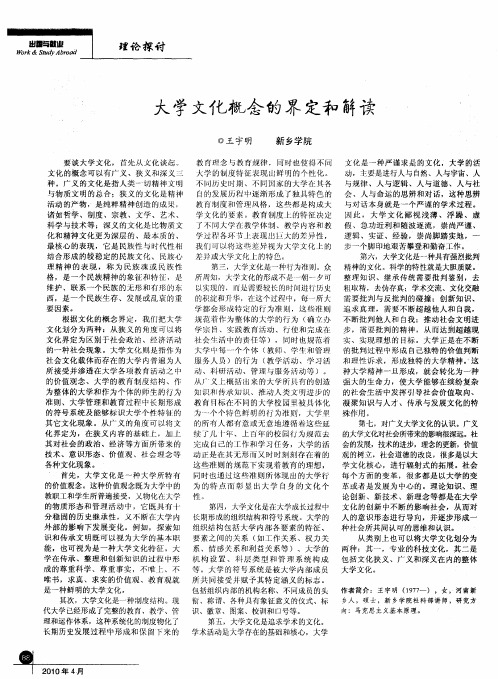
出蛋与取业
肋 睹 & s u yAbo d ta ’ r a
i竺
大学文化概念的界定和 解读
◎王 宇明 新 乡学 院
要谈大学文化 ,首先从文 化谈起 。 教 育琊 念 与教育规律 ,同时也使 得不 同 文化 是一种严谨求 是的文化,大学 的活 文 化的概念可 以有广 义、狭 义和 深义二 大 学 的 制 度 特 征 表 现 出 鲜 明 的个 性 化 。 动,主要是进行人与 自然、人与宇宙、人 种 。广 义 的 文 化 是 指 人 类 一 切 精 神 文 明 不 I 力史 时 期 、 不 同 国 家 的 大 学 在 其 各 与规 律、人与逻 辑、人与道德 、人与社 刮J 与物质 文明的总合 ;狭 义 的文化 是精神 自的 发 展 历 中 逐 渐 形 成 了 独 具 特 色 的 会 、 人 与 命 运 的 思 辨 和 对 话 , 这 种 思 辨 活动 的产物 ,是纯粹精神 创造 的成 果, 教 育制度和 管理风格 ,这些 都是构成 大 与对 பைடு நூலகம்本身就 是一个严谨 的学术 过程 。 诸如哲学 、制度 、宗 教、文学 、艺术、 学文化 的要素 。教育制度 上的特征 决定 因此 ,大 学 文化 鄙 视 浅薄 、浮躁 、虚 科学与技术 等;深义 的文 化是 比物质 文 了不 同大学 在教学体制 、教 学 内容和 教 假 、急功近利和 随波逐流 ,崇 尚严 谨、 化和精神文 化更 为深层 的、最本质 的、 学 过 稃 各 环 l上 表 现 出 大 的差 异 性 , 什 逻辑 、实证 、经验 ,崇 尚脚踏实地 ,一 最 核 心 的表 现 , 它 是 民族 性 与时 代 性 相 我 们 可 以将 这 些 差 异 视 为 大 学 文 化 上 的 步一个脚印地艰苦攀登和勤奋工作。 结合形成的较稳 定的 民族文 化、 民族心 差 异 或 大 学 文 化 上的特 色 。 第 六 ,大 学文 化是 一种 具有 强 烈批 判 理精 神 的表 现 ,称 为 民族 魂 或 民族 性 第 三 ,大 学文 化是 一种 行 为准 则 。众 精神的文化 。科学的特性就是大胆质疑。 格 ,是一个 民族精神 的象征和特 征 ,是 所 周知 ,大学 文化 的形成 不 是 一朝 一 夕可 整 理 知 识 、 继 承 传 统 需 要 批 判 鉴 别 , 去 维护 、联系一个 民族 的无形和 _ 形的东 以实现 的 ,而 是 需要 较 长的 时 间进 行历 史 粗取精,去伪存真;学术交流、文化交融 仃 西,是一 个 民族生存 、发展或乱衰 的重 的积 淀 和升 华 ,在 这个 过 程 中 ,每 一所 人 需要批判与反批 判的碰撞 ;创新 知识 、 一 要因素。 学 都会 形 成 特 定 的 行 为 准 则 , 这 些 准 则 追 求真理 ,需 要不断超越他人和 自我, 根据文化 的概念界定 ,我们把大学 规 范 着 作 为 整 体 的 大 学 的行 为 ( 确 办 不 断批 判 他 人 和 自我 ; 推 动 社 会 文 明进 文 化 划 分 为 两 种 : 从 狭 义 的 角 度 可 以将 学 宗 旨、实 践教育活动 、行 使和完成在 步 ,需要批判 的精 神 ,从而达到超越 现 文 化 界 定 为 区 别 于 社 会 政 治 、 经 济 活 动 社 会 牛 活 中 的责 任 等 ) , 间 时 也 规 范 着 实 、 实 现 理 想 的 目标 。 大 学 正 是 在 不 断 的 一 种 社 会 现 象 。大 学 文 化 则 是 指 作 为 大学 中每一个个 体 ( 教师 、学 牛和管理 的 批 判 过 程 中 形成 自己 独特 的 价 值 判 断 社会文化载体 而存在的大学 内普遍为人 服 务人 员 ) 的行 为 ( 学 活 动 、 学 习 活 和 理 性 诉 求 ,形 成 独 特 的 大 学 精 神 。这 教 所 接受并渗透在大 学各项 教 育活动之 中 动 、科 研 活 动 、 管理 与 服 务 活 动 等 ) 。 种大学 精神一旦形成 ,就 会转化为一种 的价 值观念 、大 学的教育制度 结构、作 从 ,‘ 上概 括 出来 的 大 学 所 具 有 的 创 造 强大 的生命 力 ,使大学 能够 在缤纷复杂 义 为整 体的大学和作 为个体的帅生 的行为 知 识利 传承 知 识 、推 动 人 类 文 明进 步 的 的 社 会 生活 中 发 挥 引 导 社 会 价 值 取 向、 准则 、大学管理和教育 过程 中长期 形成 教育 目标在 不同的大学校 园罩被具体化 凝 聚知识与 人才 、传承与发 展文 化的特 的符 号系统及 能够标识 大学个性特 的 为 … 个 个 特 色 鲜 明 的 行 为准 则 ,大 学 罩 殊作用 。 其它文化现象 。从广义 的角度可 以将 文 的所 有 人 都 有 意 或 无 意 地 遵 循 着 这 些 延 第七,对广义大学文化的认识 。广义 化界定为 ,在狭 义 内容 的基 础上,加上 续 L 年 、上 百年 的 校 园行 为 舰 范 去 的大学文化对社会所带来的影响很深远 社 其对社会 的政 治、经济等方 面所带来 的 完成 自己的工作和 学习任务 ,大 学的活 会的发展,技术的进步,理念的更新,价值 技术 、意识形态 、价值观 、社会 理念等 动 正 是在 其 无 形 而 义 时 时 刻 刻 存 在 着 的 观的树立,社会道德的改 良,很多是以大 各种文化现象。 这些准 则的规范下实现着 教育 的理 想, 学文化 核心 ,进行辐射 式的拓展 。社会 首先 , 大 学 文 化 是 ~ 种 大 学 所 特 有 同 时 也 通 过 这 些 准 则 所 体 现 出 的大 学 行 每 个 方 面 的 变 革 ,很 多都 是 以 大 学 的 变 的价值观念 。这种价值观念既为大学中的 为 的特 点 而 彰 显 出大 学 自身 的文 化个 革 或 者 是 发展 为 中心 的 。 理 论 知 识 、 理 教 职工 和 学生 所 普遍 接 受 ,义物 化 在人 学 性 。 论创新 、新 技术 、新理念 等都是在大学 的 物质 形 态 和 管 理 活 动 中 , 它 既 具 有 十 第 四 ,大 学 文化 是在 大 学成 长过 程 中 文 化的创新 中不断的影响 社会 ,从而对 分 稳 固 的历 史 继 承 性 ,义 不 断 在 大 学 内 长 期 形成 的 组织 结 构和 符 号系 统 。大 学 的 人 的意识形态进 行导 向,并逐 步形成一 外部的影 响下发展 变化 。例 如,探索知 组 织 结 构 包 括 大 学 内部 各 要 素 的特 征 、 种 社 会 所 共 同认 可 的 思 维和 认识 。 识和传承文 明既可 以视 为大 学的基本职 要 素 之 间 的关 系 ( 工 作 关 系 、 权 力 关 如 从 类别上也 可以将大学文化划 分为 能 , 也 可 视 为 是 一 种 大 学 文 化 特 征 。大 系 、情感 关系和利益 关系等 )、大 学的 两种 :其 一 ,专业 的科 技文化 ,其 二是 学 在 传 承 、 整 理 和 创 新 知 识 的过 程 中 形 机 构 设 置 、 科 层 类 型 和 管 理 系 统 构 成 包括文化狭 义 、广义和 深义在 内l 的整体 成 的尊 重科 学 、 尊 重 事 实 , 不 唯 t、 不 等。大学 的符号系统是 被大学 内部 成员 大 学 文 化 。 唯书 ,求真、求实 的价 值观 、教 育观 就 所共 同接受并赋 予其特定涵义 的标志 。 是 一 种鲜 明 的大 学 文 化 。 包 括 组织 内部 的机 构名 称 、 不 同成 员 的头 作 者简介 :王宇 明 (9 7 ) ,女 ,河南新 17 一 其 次 ,大学 文化 是 一种 制度 结 构 。现 衔 、称谓 、各种具有象征意义的仪式 、标 乡人 ,硕 士 ,新 乡学院社科部讲 师,研究方 代 大 学 已经 形成 了完整 的 教育 、 教学 、 管 识 、徽 章 、 图案 、校训 和 口号 等 。 向 : 马克 思 主 义 基 本 原 理 。 理和运作体系,这种系统化 的制度物化了 第 五 ,大 学文 化 是追 求 学术 的文 化 。 长期历史发展过 程中形成 和保 留 F来的 学术活动是大学存在的基础和核心,大学
大学文化的英文演讲稿
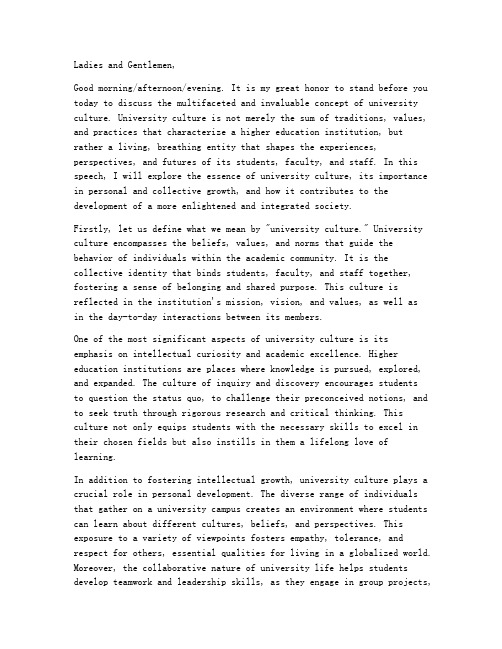
Ladies and Gentlemen,Good morning/afternoon/evening. It is my great honor to stand before you today to discuss the multifaceted and invaluable concept of university culture. University culture is not merely the sum of traditions, values, and practices that characterize a higher education institution, butrather a living, breathing entity that shapes the experiences, perspectives, and futures of its students, faculty, and staff. In this speech, I will explore the essence of university culture, its importance in personal and collective growth, and how it contributes to the development of a more enlightened and integrated society.Firstly, let us define what we mean by "university culture." University culture encompasses the beliefs, values, and norms that guide the behavior of individuals within the academic community. It is the collective identity that binds students, faculty, and staff together, fostering a sense of belonging and shared purpose. This culture is reflected in the institution's mission, vision, and values, as well asin the day-to-day interactions between its members.One of the most significant aspects of university culture is its emphasis on intellectual curiosity and academic excellence. Higher education institutions are places where knowledge is pursued, explored, and expanded. The culture of inquiry and discovery encourages studentsto question the status quo, to challenge their preconceived notions, and to seek truth through rigorous research and critical thinking. This culture not only equips students with the necessary skills to excel in their chosen fields but also instills in them a lifelong love of learning.In addition to fostering intellectual growth, university culture plays a crucial role in personal development. The diverse range of individuals that gather on a university campus creates an environment where students can learn about different cultures, beliefs, and perspectives. This exposure to a variety of viewpoints fosters empathy, tolerance, and respect for others, essential qualities for living in a globalized world. Moreover, the collaborative nature of university life helps students develop teamwork and leadership skills, as they engage in group projects,participate in extracurricular activities, and take on leadership roles within their communities.University culture also contributes to the collective growth of society. By producing well-rounded, knowledgeable, and compassionate individuals, universities play a significant role in shaping the future of our world. Graduates of these institutions are equipped to tackle the challenges of the 21st century, from addressing climate change and promoting sustainable development to fostering social justice and economic equality. The knowledge and skills acquired during their time at university enable them to make meaningful contributions to their communities and beyond.Now, let us delve into the key elements that constitute the essence of university culture:1. Academic Freedom: Universities are places where ideas are freely exchanged and debated. Academic freedom is essential for the pursuit of knowledge and the development of new theories and discoveries. It allows for the exploration of various perspectives and encourages critical thinking.2. Diversity and Inclusion: A university culture that embraces diversity and promotes inclusivity is more vibrant and dynamic. It allows for the exchange of ideas and fosters a deeper understanding of the complexities of our world. Inclusive environments help build a more just and equitable society.3. Integrity and Ethics: University culture must emphasize the importance of integrity and ethics in all aspects of academic and personal life. By instilling a strong moral compass, universities prepare students to make ethical decisions and contribute positively to society.4. Service and Engagement: Universities should encourage students to engage in community service and social responsibility. This not only benefits the community but also helps students develop a sense of purpose and connection to the world around them.5. Innovation and Entrepreneurship: The spirit of innovation and entrepreneurship is vital for economic growth and societal advancement. Universities can nurture this spirit by providing opportunities for students to engage in research, start their own businesses, and develop new technologies.In conclusion, university culture is a vital component of higher education that shapes the experiences, perspectives, and futures of its members. By emphasizing intellectual curiosity, personal development,and collective growth, universities contribute to the betterment of society. As we continue to navigate the complexities of our world, it is essential that we uphold and strengthen the values that define our university culture.Thank you for your attention. I invite you to reflect on the role university culture plays in your own life and consider how you can contribute to the continued growth and success of our academic community. Together, we can build a future that is both enlightened and integrated, guided by the principles that make university culture truly exceptional.Thank you.。
传统文化在大学教育中的重要性英语作文
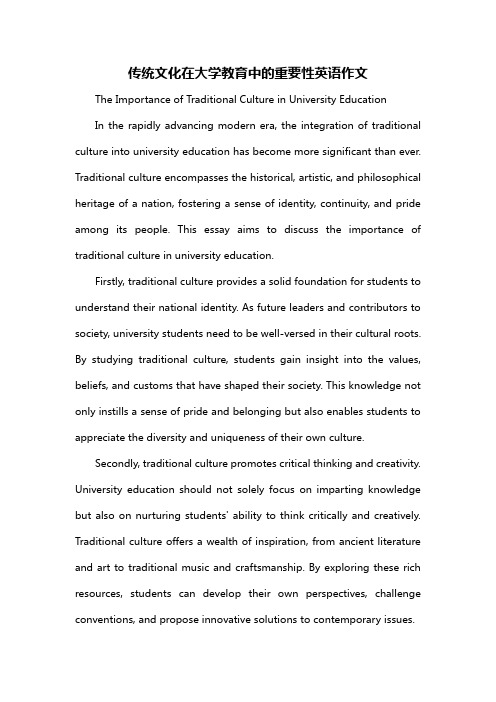
传统文化在大学教育中的重要性英语作文The Importance of Traditional Culture in University EducationIn the rapidly advancing modern era, the integration of traditional culture into university education has become more significant than ever. Traditional culture encompasses the historical, artistic, and philosophical heritage of a nation, fostering a sense of identity, continuity, and pride among its people. This essay aims to discuss the importance of traditional culture in university education.Firstly, traditional culture provides a solid foundation for students to understand their national identity. As future leaders and contributors to society, university students need to be well-versed in their cultural roots. By studying traditional culture, students gain insight into the values, beliefs, and customs that have shaped their society. This knowledge not only instills a sense of pride and belonging but also enables students to appreciate the diversity and uniqueness of their own culture.Secondly, traditional culture promotes critical thinking and creativity. University education should not solely focus on imparting knowledge but also on nurturing students' ability to think critically and creatively. Traditional culture offers a wealth of inspiration, from ancient literature and art to traditional music and craftsmanship. By exploring these rich resources, students can develop their own perspectives, challenge conventions, and propose innovative solutions to contemporary issues.Furthermore, traditional culture serves as a bridge between the past and the future. It allows students to learn from the wisdom and experiences of their ancestors, helping them to navigate the complexities of modern life. By understanding the evolution of their culture, students can gain valuable insights into societal development, contributing to a more nuanced understanding of the world.Moreover, the integration of traditional culture in university education fosters cultural preservation and transmission. As the world becomes increasingly globalized, there is a risk of certain traditional cultures being marginalized or lost. Universities play a crucial role in preserving these cultures by offering courses, organizing events, and promoting research in traditional arts, languages, and customs. By doing so, universities ensure that future generations can continue to appreciate and carry forward their cultural heritage.Lastly, traditional culture enhances students' interpersonal skills and global citizenship. In a multicultural society, the ability to understand and appreciate different cultures is essential. By studying traditional culture, students can develop empathy, respect, and tolerance towards diverse backgrounds. This not only enriches their personal lives but also prepares them to engage with the global community in a meaningful and responsible manner.In conclusion, traditional culture holds immense importance inuniversity education. It provides a foundation for understanding national identity, fosters critical thinking and creativity, bridges the past and the future, preserves cultural heritage, and enhances interpersonal skills and global citizenship. Embracing traditional culture in university education ensures that students receive a well-rounded education, equipping them to face the challenges of the modern world while preserving the rich tapestry of their cultural heritage.。
大学生传承中国传统文化英语作文
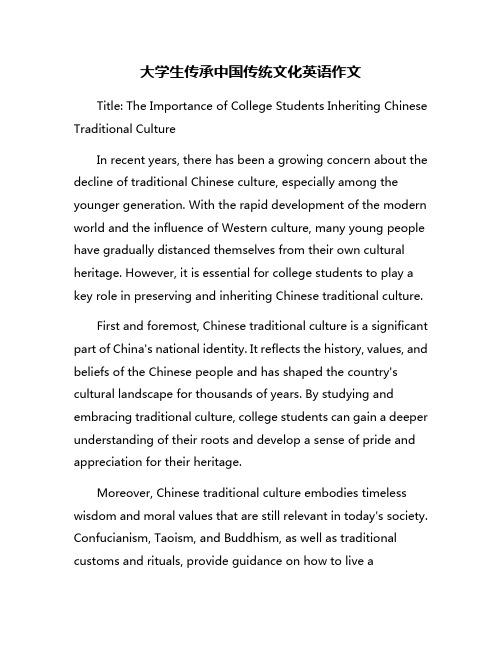
大学生传承中国传统文化英语作文Title: The Importance of College Students Inheriting Chinese Traditional CultureIn recent years, there has been a growing concern about the decline of traditional Chinese culture, especially among the younger generation. With the rapid development of the modern world and the influence of Western culture, many young people have gradually distanced themselves from their own cultural heritage. However, it is essential for college students to play a key role in preserving and inheriting Chinese traditional culture.First and foremost, Chinese traditional culture is a significant part of China's national identity. It reflects the history, values, and beliefs of the Chinese people and has shaped the country's cultural landscape for thousands of years. By studying and embracing traditional culture, college students can gain a deeper understanding of their roots and develop a sense of pride and appreciation for their heritage.Moreover, Chinese traditional culture embodies timeless wisdom and moral values that are still relevant in today's society. Confucianism, Taoism, and Buddhism, as well as traditional customs and rituals, provide guidance on how to live ameaningful and virtuous life. By learning from these cultural traditions, college students can cultivate their moral character, enhance their critical thinking skills, and become more compassionate and empathetic individuals.Furthermore, Chinese traditional culture is a valuable resource for promoting cultural exchange and mutual understanding between different countries and peoples. As globalization continues to bring people from diverse backgrounds together, it is essential for college students to appreciate and respect the cultural differences of others while also sharing their own cultural heritage. By preserving and promoting Chinese traditional culture, college students can contribute to the enrichment of global cultural diversity and foster closer ties with people from around the world.In addition, inheriting Chinese traditional culture can also have a positive impact on personal well-being and mental health. Studies have shown that engaging in cultural activities, such as traditional music, dance, calligraphy, and martial arts, can reduce stress, increase creativity, and improve overall happiness. By immersing themselves in Chinese traditional culture, college students can find a sense of purpose, connection, and fulfillment in their lives.To conclude, college students have a crucial role to play in preserving and inheriting Chinese traditional culture. By embracing their cultural heritage, they can strengthen their national identity, cultivate moral values, promote cultural exchange, and enhance personal well-being. It is essential for college students to recognize the importance of their cultural heritage and take proactive steps to pass on this invaluable legacy to future generations. Only by preserving and promoting Chinese traditional culture can we ensure that it continues to thrive and inspire future generations to come.。
中国文化对大学生的重要性英语作文
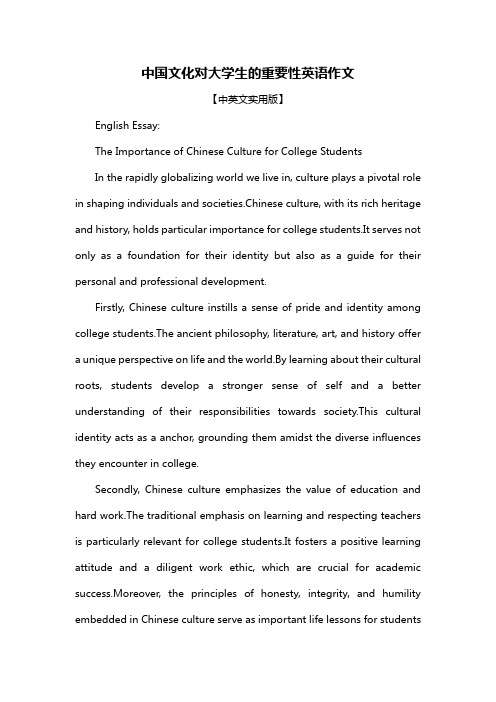
中国文化对大学生的重要性英语作文【中英文实用版】English Essay:The Importance of Chinese Culture for College StudentsIn the rapidly globalizing world we live in, culture plays a pivotal role in shaping individuals and societies.Chinese culture, with its rich heritage and history, holds particular importance for college students.It serves not only as a foundation for their identity but also as a guide for their personal and professional development.Firstly, Chinese culture instills a sense of pride and identity among college students.The ancient philosophy, literature, art, and history offer a unique perspective on life and the world.By learning about their cultural roots, students develop a stronger sense of self and a better understanding of their responsibilities towards society.This cultural identity acts as a anchor, grounding them amidst the diverse influences they encounter in college.Secondly, Chinese culture emphasizes the value of education and hard work.The traditional emphasis on learning and respecting teachers is particularly relevant for college students.It fosters a positive learning attitude and a diligent work ethic, which are crucial for academic success.Moreover, the principles of honesty, integrity, and humility embedded in Chinese culture serve as important life lessons for studentsas they navigate the complexities of college life and prepare for their future careers.Thirdly, the study of Chinese culture promotes critical thinking and creativity.The Chinese language, with its unique writing system and rich vocabulary, challenges students to think in different ways.Additionally, traditional Chinese literature, poetry, and art encourage students to explore abstract concepts and express their ideas in innovative ways.These skills are invaluable in the modern workforce, where creativity and critical thinking are highly sought after.Lastly, Chinese culture contributes to global understanding and cross-cultural communication.As China continues to play an increasingly significant role on the world stage, proficiency in Chinese language and culture becomes a valuable asset.College students who are well-versed in Chinese culture can act as bridges between the East and the West, fostering mutual respect and cooperation.In conclusion, the importance of Chinese culture for college students cannot be overstated.It shapes their identity, fosters valuable life skills, promotes critical thinking, and enhances global understanding.By embracing and learning from their cultural heritage, students are better equipped to face the challenges of college life and the professional world beyond.中文作文:中国文化对大学生的重要性在快速全球化的世界中,文化在塑造个人和社会方面发挥着至关重要的作用。
文化遗产保护与传承:大学生的文化自信英文演讲稿范文
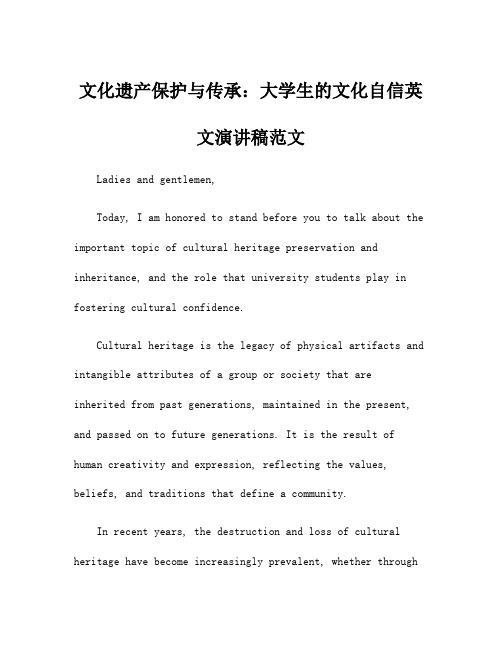
文化遗产保护与传承:大学生的文化自信英文演讲稿范文Ladies and gentlemen,Today, I am honored to stand before you to talk about the important topic of cultural heritage preservation and inheritance, and the role that university students play in fostering cultural confidence.Cultural heritage is the legacy of physical artifacts and intangible attributes of a group or society that areinherited from past generations, maintained in the present, and passed on to future generations. It is the result of human creativity and expression, reflecting the values, beliefs, and traditions that define a community.In recent years, the destruction and loss of cultural heritage have become increasingly prevalent, whether throughnatural disasters, human conflict, or neglect. This loss not only erases the identity and history of a community but also diminishes the diversity and richness of our global cultural tapestry. As the future leaders of our society, it is our responsibility to preserve and protect cultural heritage for future generations.Furthermore, cultural inheritance is just as important as cultural preservation. It involves the passing down of cultural knowledge, traditions, and values from one generation to the next. Through cultural inheritance, we ensure that the essence of a culture remains alive and relevant in the present day.As university students, we can contribute to the preservation and inheritance of cultural heritage in several ways. Firstly, we can actively participate in cultural preservation initiatives, such as volunteer work, research projects, or advocacy campaigns. By doing so, we can raiseawareness about the importance of cultural heritage and inspire others to take action.Additionally, we can engage in the study and promotion of our own cultural heritage. By learning about our own cultural roots, we can develop a sense of cultural confidence thatwill empower us to preserve and promote our heritage.Moreover, university students can also serve as role models for younger generations by passing down cultural knowledge and traditions. Whether it is through mentorship programs, educational workshops, or community outreach, we can play a pivotal role in ensuring that cultural inheritance remains a priority in our society.In conclusion, the preservation and inheritance of cultural heritage are crucial for maintaining the diversity and richness of our global community. As university students, we have the power to make a difference in this endeavor. Let us embrace our cultural heritage with confidence and pass iton to future generations, thus ensuring that our cultural legacy remains vibrant and relevant for years to come.Thank you.。
大学的传统英语作文
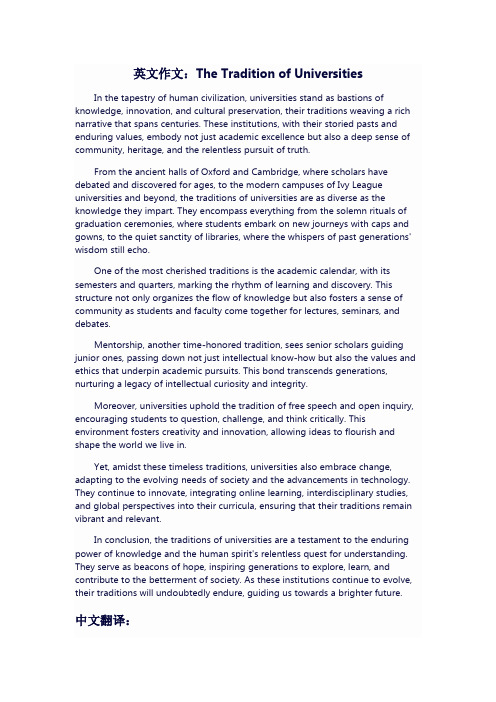
英文作文:The Tradition of Universities In the tapestry of human civilization, universities stand as bastions of knowledge, innovation, and cultural preservation, their traditions weaving a rich narrative that spans centuries. These institutions, with their storied pasts and enduring values, embody not just academic excellence but also a deep sense of community, heritage, and the relentless pursuit of truth.From the ancient halls of Oxford and Cambridge, where scholars have debated and discovered for ages, to the modern campuses of Ivy League universities and beyond, the traditions of universities are as diverse as the knowledge they impart. They encompass everything from the solemn rituals of graduation ceremonies, where students embark on new journeys with caps and gowns, to the quiet sanctity of libraries, where the whispers of past generations' wisdom still echo.One of the most cherished traditions is the academic calendar, with its semesters and quarters, marking the rhythm of learning and discovery. This structure not only organizes the flow of knowledge but also fosters a sense of community as students and faculty come together for lectures, seminars, and debates.Mentorship, another time-honored tradition, sees senior scholars guiding junior ones, passing down not just intellectual know-how but also the values and ethics that underpin academic pursuits. This bond transcends generations, nurturing a legacy of intellectual curiosity and integrity.Moreover, universities uphold the tradition of free speech and open inquiry, encouraging students to question, challenge, and think critically. This environment fosters creativity and innovation, allowing ideas to flourish and shape the world we live in.Yet, amidst these timeless traditions, universities also embrace change, adapting to the evolving needs of society and the advancements in technology. They continue to innovate, integrating online learning, interdisciplinary studies, and global perspectives into their curricula, ensuring that their traditions remain vibrant and relevant.In conclusion, the traditions of universities are a testament to the enduring power of knowledge and the human spirit's relentless quest for understanding. They serve as beacons of hope, inspiring generations to explore, learn, and contribute to the betterment of society. As these institutions continue to evolve, their traditions will undoubtedly endure, guiding us towards a brighter future. 中文翻译:在人类文明的织锦中,大学作为知识、创新与文化传承的堡垒,其传统跨越世纪,编织出一幅幅丰富的叙事画卷。
为什么文化对大学生很重要英语作文
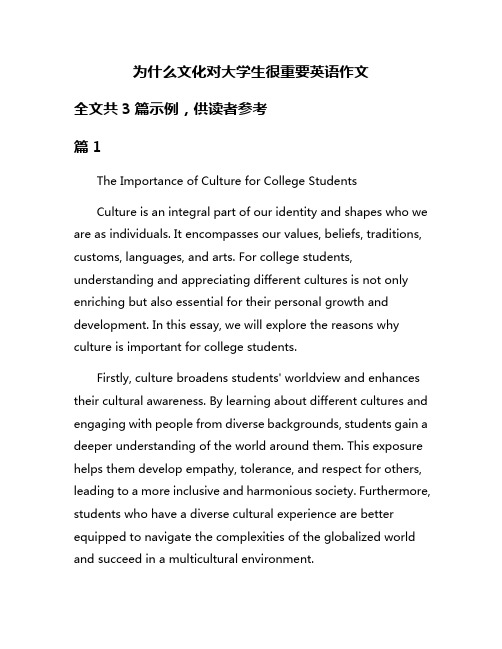
为什么文化对大学生很重要英语作文全文共3篇示例,供读者参考篇1The Importance of Culture for College StudentsCulture is an integral part of our identity and shapes who we are as individuals. It encompasses our values, beliefs, traditions, customs, languages, and arts. For college students, understanding and appreciating different cultures is not only enriching but also essential for their personal growth and development. In this essay, we will explore the reasons why culture is important for college students.Firstly, culture broadens students' worldview and enhances their cultural awareness. By learning about different cultures and engaging with people from diverse backgrounds, students gain a deeper understanding of the world around them. This exposure helps them develop empathy, tolerance, and respect for others, leading to a more inclusive and harmonious society. Furthermore, students who have a diverse cultural experience are better equipped to navigate the complexities of the globalized world and succeed in a multicultural environment.Secondly, culture enriches students' education and expands their knowledge. Studying different cultures exposes students to new ideas, perspectives, and ways of thinking. It challenges their assumptions and broadens their intellectual horizons. Cultural education also fosters critical thinking skills, creativity, and innovation, as students are encouraged to explore and analyze diverse cultural texts, artifacts, and practices. By embracing cultural diversity, students can acquire a more holistic education that prepares them for a rapidly changing and interconnected world.Moreover, culture enhances students' personal growth and self-discovery. Exploring their own cultural heritage and identity can provide students with a sense of belonging and pride. It can also help them develop a strong sense of self-awareness and confidence. Additionally, exposure to different cultures allows students to discover new passions, interests, and talents. By embracing diversity, students can cultivate a deeper appreciation for their own culture and identity while also celebrating the richness and beauty of other cultures.In conclusion, culture plays a crucial role in the lives of college students. It enriches their education, broadens their worldview, and enhances their personal growth. By embracingcultural diversity, students can become more open-minded, empathetic, and knowledgeable individuals. Therefore, it is essential for colleges and universities to promote cultural awareness and appreciation among their students. Only by embracing diversity can we create a more inclusive and harmonious society for future generations.篇2Why Culture is Important for College StudentsCulture plays a significant role in shaping the worldview and values of individuals, especially for college students. In today's globalized world, where people from diverse backgrounds come together, understanding and appreciating different cultures has become increasingly important. This is why cultural education is essential for college students as it helps them develop a broader perspective, enhances their critical thinking skills, and prepares them to effectively navigate the complexities of an interconnected world.One of the key reasons why culture is important for college students is that it helps them develop a better understanding of themselves and their own cultural identity. By exploring different cultures, students can gain insights into their own values, beliefs,and traditions, and how these are influenced by the larger cultural context in which they live. This self-awareness can help students build a strong sense of identity and develop a deeper appreciation for their own cultural heritage.Moreover, cultural education fosters empathy and tolerance among college students by exposing them to different viewpoints and ways of life. By learning about other cultures, students can develop a greater sense of empathy towards people from different backgrounds and cultivate a more inclusive mindset. This empathy and tolerance are essential in today's diverse society, where individuals with different cultural backgrounds must work together and understand each other to achieve common goals.Cultural education also enhances critical thinking skills among college students by challenging their preconceived notions and stereotypes. By engaging with different cultures, students are forced to question their assumptions and biases, and critically evaluate the information they receive. This critical thinking helps students become more open-minded, analytical, and able to make informed decisions based on evidence rather than stereotypes or prejudices.Furthermore, cultural education prepares college students to navigate the complexities of an interconnected world by equipping them with the necessary skills and knowledge to communicate and collaborate effectively with people from diverse backgrounds. In today's globalized economy, where businesses operate across borders and people from different cultures interact on a daily basis, cultural competence is a valuable skill that can open up new opportunities and enhance one's career prospects.In conclusion, culture is important for college students because it helps them develop a broader perspective, enhances their critical thinking skills, fosters empathy and tolerance, and prepares them to navigate the complexities of an interconnected world. By embracing cultural education, college students can gain a deeper understanding of themselves and others, and contribute positively to a more diverse and inclusive society. Ultimately, cultural education is essential for shapingwell-rounded and globally-minded individuals who can thrive in today's interconnected world.篇3Why Culture is Important for College StudentsCulture plays an essential role in shaping the values, beliefs, and behaviors of individuals. For college students, being exposed to different cultures can provide valuable insights and broaden their perspectives. Here are some reasons why culture is important for college students:1. Diversity and InclusionCollege campuses are melting pots of diverse cultures, backgrounds, and experiences. By embracing cultural diversity, students can learn to appreciate and respect people from all walks of life. This promotes inclusivity and fosters a sense of belonging among students. Understanding and accepting different cultures can also help students become more empathetic and compassionate individuals.2. Global PerspectiveIn today's interconnected world, having a global perspective is more important than ever. By learning about different cultures, college students can gain a better understanding of the world around them. This can help them navigate the complexities of an increasingly globalized society and prepare them for future job opportunities that require cross-cultural communication and collaboration.3. Critical ThinkingStudying different cultures can help students develop critical thinking skills. By comparing and contrasting different cultural practices, beliefs, and values, students can learn to analyze and evaluate information from multiple perspectives. This can enhance their problem-solving abilities and make them more adaptable in diverse situations.4. Personal GrowthExploring different cultures can be a transformative experience for college students. It can challenge their preconceived notions and expand their worldview. By stepping outside of their comfort zones, students can discover new ways of thinking, living, and being. This personal growth can lead to greater self-awareness, self-confidence, and self-acceptance.5. Social AwarenessCultural awareness is key to promoting social justice and equality. By learning about different cultures, college students can become more aware of social issues and disparities that exist both locally and globally. This awareness can inspire them to take action and advocate for positive change in their communities.In conclusion, culture is a vital aspect of college education that can enhance students' personal, academic, and professional development. By embracing cultural diversity, gaining a global perspective, developing critical thinking skills, fostering personal growth, and promoting social awareness, college students can become more well-rounded individuals who are better equipped to navigate the complexities of the modern world.。
大学校园文化作文
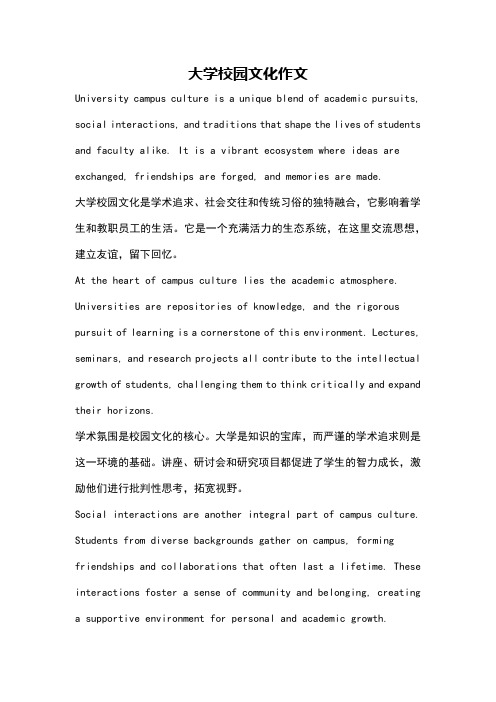
大学校园文化作文University campus culture is a unique blend of academic pursuits, social interactions, and traditions that shape the lives of students and faculty alike. It is a vibrant ecosystem where ideas are exchanged, friendships are forged, and memories are made.大学校园文化是学术追求、社会交往和传统习俗的独特融合,它影响着学生和教职员工的生活。
它是一个充满活力的生态系统,在这里交流思想,建立友谊,留下回忆。
At the heart of campus culture lies the academic atmosphere. Universities are repositories of knowledge, and the rigorous pursuit of learning is a cornerstone of this environment. Lectures, seminars, and research projects all contribute to the intellectual growth of students, challenging them to think critically and expand their horizons.学术氛围是校园文化的核心。
大学是知识的宝库,而严谨的学术追求则是这一环境的基础。
讲座、研讨会和研究项目都促进了学生的智力成长,激励他们进行批判性思考,拓宽视野。
Social interactions are another integral part of campus culture. Students from diverse backgrounds gather on campus, forming friendships and collaborations that often last a lifetime. These interactions foster a sense of community and belonging, creating a supportive environment for personal and academic growth.社交互动也是校园文化不可或缺的一部分。
传统文化在大学教育中的重要性英语作文
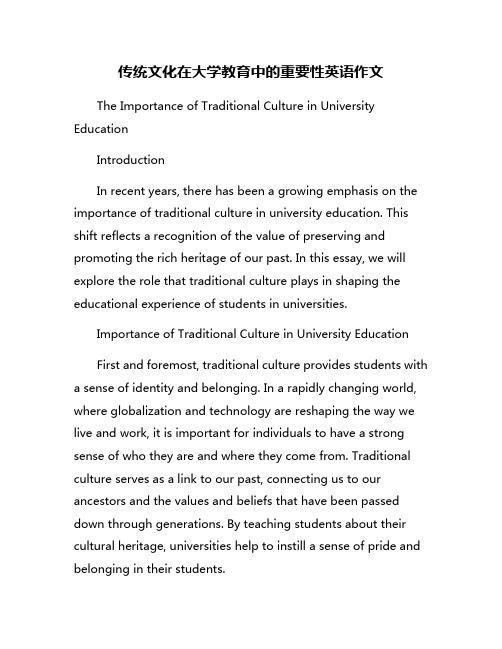
传统文化在大学教育中的重要性英语作文The Importance of Traditional Culture in University EducationIntroductionIn recent years, there has been a growing emphasis on the importance of traditional culture in university education. This shift reflects a recognition of the value of preserving and promoting the rich heritage of our past. In this essay, we will explore the role that traditional culture plays in shaping the educational experience of students in universities.Importance of Traditional Culture in University EducationFirst and foremost, traditional culture provides students with a sense of identity and belonging. In a rapidly changing world, where globalization and technology are reshaping the way we live and work, it is important for individuals to have a strong sense of who they are and where they come from. Traditional culture serves as a link to our past, connecting us to our ancestors and the values and beliefs that have been passed down through generations. By teaching students about their cultural heritage, universities help to instill a sense of pride and belonging in their students.Furthermore, traditional culture offers valuable lessons and insights that can help students navigate the complexities of the modern world. Many traditional stories, myths, and legends contain timeless wisdom and moral lessons that are still relevant today. By studying these cultural artifacts, students can gain a deeper understanding of human nature, society, and the world around them. Traditional culture also provides a framework for understanding different perspectives and worldviews, helping students to develop empathy and tolerance for diverse beliefs and practices.In addition, traditional culture can inspire creativity and innovation in students. By exposing students to different art forms, music, dance, and literature from their cultural heritage, universities can help to foster a spirit of creativity and imagination in their students. Traditional culture offers a rich tapestry of ideas, images, and symbols that can serve as a source of inspiration for students in their academic and creative pursuits. By drawing on the traditions of the past, students can develop a deeper appreciation for the beauty and complexity of the world around them.Moreover, traditional culture can foster a sense of community and collaboration among students. By participatingin cultural activities and events, students can form bonds with their peers and create a sense of shared identity and purpose. Traditional culture provides a common language and shared experiences that can bring students together and create a sense of unity and cooperation. By celebrating their cultural heritage, students can create a sense of belonging and connection that can enhance their educational experience and enrich their lives.ConclusionIn conclusion, traditional culture plays a vital role in university education by providing students with a sense of identity, wisdom, creativity, and community. By incorporating traditional culture into the curriculum and campus life, universities can help students develop a deeper appreciation for their cultural heritage and a greater understanding of the world around them. By preserving and promoting traditional culture, universities can ensure that future generations continue to benefit from the rich legacy of our past.。
传统文化在大学教育中的重要性英语作文
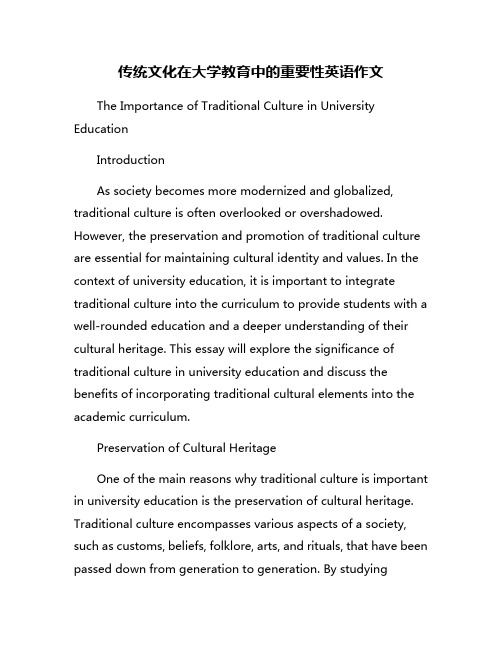
传统文化在大学教育中的重要性英语作文The Importance of Traditional Culture in University EducationIntroductionAs society becomes more modernized and globalized, traditional culture is often overlooked or overshadowed. However, the preservation and promotion of traditional culture are essential for maintaining cultural identity and values. In the context of university education, it is important to integrate traditional culture into the curriculum to provide students with a well-rounded education and a deeper understanding of their cultural heritage. This essay will explore the significance of traditional culture in university education and discuss the benefits of incorporating traditional cultural elements into the academic curriculum.Preservation of Cultural HeritageOne of the main reasons why traditional culture is important in university education is the preservation of cultural heritage. Traditional culture encompasses various aspects of a society, such as customs, beliefs, folklore, arts, and rituals, that have been passed down from generation to generation. By studyingtraditional culture, students can gain a better understanding of their roots and cultural identity. It also helps them appreciate the rich history and diversity of their culture.Moreover, traditional culture reflects the values, norms, and beliefs of a society, which play a crucial role in shaping individual behavior and societal norms. By studying traditional culture in university education, students can learn valuable lessons about respect, integrity, harmony, and community, which are essential for personal and social development.Promotion of Cultural DiversityAnother reason why traditional culture is important in university education is the promotion of cultural diversity. Traditional cultures differ from one society to another, and they contribute to the diversity of human cultures. By studying traditional culture, students can gain a broader perspective on the world and appreciate the uniqueness of different cultural traditions.Furthermore, the study of traditional culture can help break down stereotypes and prejudices, promoting intercultural understanding and harmony. In a multicultural society, it is crucial for individuals to respect and appreciate the cultural differences of others. By incorporating traditional culturalelements into university education, students can develop a sense of empathy, tolerance, and cultural sensitivity, which are essential for building a more inclusive and harmonious society.Development of Critical Thinking SkillsStudying traditional culture in university education can also help students develop critical thinking skills. Traditional cultures often contain wisdom and knowledge that are relevant to contemporary issues and challenges. By analyzing traditional cultural texts, artifacts, and practices, students can learn how people in the past addressed social, political, economic, and environmental issues.Moreover, the study of traditional culture can foster creativity, imagination, and problem-solving skills. Traditional cultures often contain myths, legends, and stories that inspire individuals to think outside the box and explore new perspectives. By engaging with traditional cultural materials, students can develop their analytical, interpretive, and creative abilities, which are essential for academic success and personal growth.Enhancement of Well-Being and Mental HealthIn addition, studying traditional culture in university education can enhance students' well-being and mental health. Traditional cultures often contain rituals, practices, and beliefs that promote physical, emotional, and spiritual well-being. By engaging with traditional cultural practices, students can learn how to manage stress, cultivate mindfulness, and maintain a healthy lifestyle.Moreover, traditional cultures often emphasize the importance of community, connection, and belonging, which are essential for mental health and social well-being. By studying traditional culture, students can develop a sense of identity, purpose, and meaning, which can help them navigate the challenges of university life and beyond.ConclusionIn conclusion, traditional culture plays a crucial role in university education by preserving cultural heritage, promoting cultural diversity, developing critical thinking skills, and enhancing well-being and mental health. By integrating traditional cultural elements into the academic curriculum, universities can provide students with a well-rounded education and a deeper understanding of their cultural heritage. It is essential for universities to recognize the importance oftraditional culture in education and take steps to incorporate traditional cultural elements into their programs. By doing so, universities can contribute to the preservation and promotion of traditional culture and promote a more inclusive, harmonious, and culturally diverse society.。
- 1、下载文档前请自行甄别文档内容的完整性,平台不提供额外的编辑、内容补充、找答案等附加服务。
- 2、"仅部分预览"的文档,不可在线预览部分如存在完整性等问题,可反馈申请退款(可完整预览的文档不适用该条件!)。
- 3、如文档侵犯您的权益,请联系客服反馈,我们会尽快为您处理(人工客服工作时间:9:00-18:30)。
也是很好的文章,我发现除了第一名的同学,第二,三,四,等等,开头都是用nowadays,就没有更好的开头了吗?现在知道为什么得不到最高分了吗?
In my view, it's a common phenomenon that exits everywhere in the world and influence both the old and the youth. Generally speaking, generation gap results in different understanding and appreciation of the great and constant changes of the world, different reactions to new things, and different attitudes to tradition principles and beliefs. Therefore, we may say where there are the old and the youth; there is the generation gap. Generation gap is natural, but very influential. If we can not deal with it appropriately, the gap will be greater and greater and consequently affect the work and the relation between the old and the young.
To solve these problems, the busy parents should sacrifice their spare time to communicate with their children actively to improve their relation. At the same time, they can also observe their children's behavior at the same time in order to understand heir children's personality as it can reduce the quarrel between them. Besides that, the parents should try to give up their absolute power in family so as lo make their children feel free to chat with them.
大学优题目要求:
题目:
要求:
Directions: For this part, you are allowed 30 minutes to write a composition on the topic. You should write at least 120 words according to the outline given below in English:
1.How does the generation gap come into being?
2.My view on the generation gap.
3.How to bridge the generation gap.
The Generation Gap
Nowadays, the problems of generation gap become more and more serious. The poor relationship between parents and their children is very common. As we all know, parents have to go out for work in order to earn more money to provide their lovely children with a better environment. Unfortunately, this causes rare communication between them and their children, so parents and children can not know deeply about each other. Thus, misinterpretation of them may easily occur.
